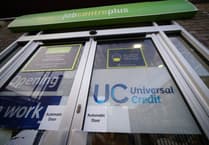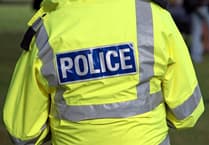The Forest of Dean's most distinguished living author has, as the Review reported last month, agreed to head up next year's Coleford Festival of Words. Coleford-born Edna Edmunds is today Lady Healey, wife of one of Britain's most popular politicians, former chancellor Denis.
"Edna Edmunds was to become, as Edna Healey, one of the political wives about whom nothing spiteful or injurious is said," the political commentator and author Edward Pearce observes in his The Lost Leaders: The best Prime Ministers we never had (1997).
"She has made a comprehensively autonomous career for herself after raising three children, in writing a life of Angela Burdett-Coutts and the recent account of Buckingham Palace." The number of titles has since increased to half a dozen and, though now 91, she continues as a lecturer and broadcaster.
Her younger sister Doreen Edmunds still lives in Coleford, which Edna visits several times a year. If accompanied by Denis, they take the road through Newnham-on-Severn, for Denis too has Forest origins.
"Denis's mother, Winnie Powell, came from Gloucestershire, the daughter of a railway stationmaster," Pearce records. Denis reminisces, says Edna, about childhood holidays spent on Newnham's narrow stretch of beach
For many years they have lived in East Sussex near Firle House, seat of the Gage family who formerly also held the Highmeadow mansion outside Coleford. Forest Bookshop owner, Doug McLean, and wife Lyn visited the couple at home last month, reporting them to be as lively as ever.
Their story is of a lustrous ascent from humble backgrounds, their inherited intelligence aided by a solid educational system. "My father [Edward Edmunds] worked as a crane driver in the stone quarry near the little village of Parkend," Edna records in Part of the Pattern – Memoirs of a Wife at Westminster (Headline Review 2006).
"I was born in a cottage in Newland Street, near the little pottery where my maternal grandfather had worked. I was the fourth child, after an elder sister and two brothers.
When I was two we moved to the house in Back Lane, now Bank Street.
"I remember him [father] carrying me on his shoulders through the Speech House woods to his old home in Parkend two miles away. Our grandmother, wearing her best black dress and a lace cap, greeted us with wide open arms.
"My grandmother, Mary Ann Trafford, came from a family whose roots were deep in the Forest. My father's sisters liked to think they were descended from the Norman French de Traffords, and it is not impossible."
Like her future husband, famous for his eyebrows and piano-playing, Edna and her family were musical. "He belonged to the band and learned to play many instruments," she says of her father.
"In my childhood he superintended my piano lessons and taught me to play the clarinet. He often walked up the woodland road to court the lively little Rose Crook.
"He was certainly charmed by the lovely voice that won my mother the title of 'Nightingale of the Forest'. He took her to Coleford dances where, as she remembered, he always wore white gloves. Lively even in her nineties, she could demonstrate how they danced the cakewalk, to the amazement of her grandchildren."
The house they lived in at the apex of Bank Street and St John's Street was later demolished for road widening. "Here I lived happily for the first eighteen years of my life," she records in The Pattern.
"I, and many of my generation, were forever moulded by the values of those times. It is because they should not be forgotten that I try to recapture the people and places and life of years now long past."
*** ***
"At the top of the lane was our house, part of a somewhat gaunt yellow-washed terrace – converted , as I later learned, from the old workhouse. In our house at 9 Bank Street we seven lived most happily, if most simply."
The five children were, in addition to herself and Doreen, their elder sister Ivy and the two brothers Bert and Victor. Of Doreen she writes, "Though the addition was most unwelcome at the time, she proved to be my mother's greatest and lifelong support, and has always been my most loyal and most loved companion.
"Where is the low stone wall surrounding the apex of that triangle, where on summer nights my friends and I sat and chatted for long goodnights. Where are my father's row of kidney beans and soldierly ranks of onions?
"Where is the stony path leading down to the shed, the coal house and the lavatory. I remember the night walks down the path, slapped by the frozen sheets on the line, a candle in a jamjar with a string handle.
"The house was cold; in winter the water in our bedroom jugs froze. Instead of hot-water bottles we had bricks, heated in the kitchen oven. I did my homework by the light of an oil lamp in the front room, wearing my coat.
"At the bottom of the garden stood the shed where he [father] mended our shoes and made wine, the coal house, and the lavatory with the neat squares of newspaper on a string. Once a week the night-soil man came. The windows were shut while he carried our bucket up to his cart and tipped the contents into the bigger rusty bucket at the back of his horse-drawn wagon.
"Early every morning [my father] went off with his can of cold tea and sandwiches – and sometimes a raw egg which, to my horror, he would suck. Daily he walked the two miles to work.
"After my father's death, the eldest son Bert stayed at home to take care of my mother, working as a dental mechanic in Monmouth. Victor started as a driver of a petrol lorry and finished his career with Esso.
"At the age of 15 my sister started her long and successful career as a telephonist. Since our back doors adjoined, the telephone exchange was an extension of our world."
*** ***
Edna meanwhile was a star pupil at Bell's Grammar School. Born one year earlier, Denis had won a scholarship to Bradford Grammar School.
"Both parents were teachers and thus travellers," Ed Pearce writes. "Denis was born in Kent, but Will Healey, rising to be principal of Keighley Technical College, would take his family to Yorkshire. The clear indication is that Winnie, not hard but strong, was the chief influence."
"Winnie's father, William Powell, was a signalman, and stationmaster, at a small village halt, long since closed, at Newnham on Severn," says Denis in his best-selling The Time of My Life (1989) autobiography.
"After her course at the teachers' training college in Cheltenham, she met and married my father at the outbreak of the Great War. Visits to my mother's family in Newnham provided my country heaven.
"We used to go there once a year while her parents were alive. I loved the salty air of the Severn Estuary and played with my brother on the tiny beach below, which was more mud than sand.
"My grandfather would take us through the orchards to his little station and let us into the signalbox when the trains were passing. Mother's brother Bert also worked on the railway.
"He lived in what then seemed to us a grand house at Grange Court nearby. What I liked most of all was to walk up the hills behind Newnham to Pleasant Stile, which has one of the loveliest views in England.
"A few miles away, at Coleford in the Forest of Dean, there was a litle girl called Edna Edmunds. Twenty years later she became my wife."
*** ***
Their paths overlapped when they both went to Oxford colleges. "I knew many girls in the Labour Club, and was a attracted by a red-cheeked girl called Edna Edmunds," Denis continues.
"She had other boyfriends then – indeed she was described as the Zuleika Dobson of St Hugh's" – this being the Max Beerbohm siren who had lovelorn undergraduates jumping off Magdalen Bridge in despair.
They didn't get together, however, until at the beginning of the war in 1939 when Edna travelled north to be interviewed for a post at Keighley Girls' Grammar School. She stayed with the Healeys and, having got the job, stayed on.
Denis went off to the wars, famously becoming beach master at the Anzio landings. Leaving the army with the rank of major, he married Edna – by now teaching at a Bromley school – at the end of the year.
"Sympathetic and loyal but entirely capable of answering back, Edna seems to have adjusted herself to Healey's imperious instincts which left him ruefully appreciative of her quality," Pearce notes.
Denis went on to become a dominant Secretary of State for Defence in the 1960s (when this writer first encountered him) and a notably successful Chancellor of the Exchequer in the difficult 1970s.
Having brought up their three children, Edna produced her first book, Lady Unknown (1978) on Angela Burdett-Coutts. She followed it with Wives of Fame (1986), biographies of Mary Livingstone, Jenny Marx and Emma Darwin.
Coutts & Co (1993) was a portrait of the famous private bank. The Queen's House (1997) was a social history of Buckingham Palace. Emma (2001) was the life of Charles Darwin's wife.
Her Part of the Pattern (2006) autobiography paints one of the best portraits of Forest life during the interwar years. It's particularly strong on the importance of Nonconformist denominations, her own family attending Coleford's Baptist church.
She will be revisiting the Newland Street chapel when, as its main venue, she inaugurates the Coleford Literary Festival next year.





Comments
This article has no comments yet. Be the first to leave a comment.